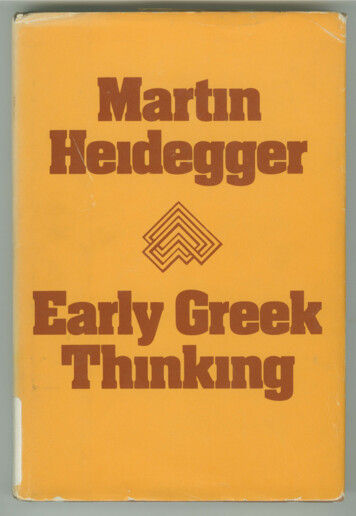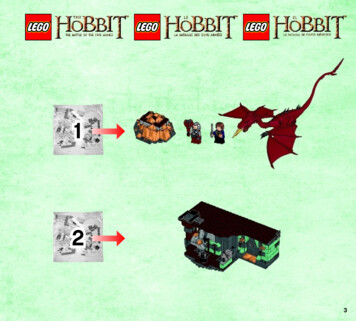
Transcription
t1nRe1deggerEarly GreekIJ'h1nk1ng
Early Greek Thinking1""-e.,. A-e.-a.-'c;.v 5 (' J
Early Greek ThinkingMartin Heidegger'Translated byDavid Farrell Krell and Frank A. CapuzziHarper & Row, PublishersNew York, Evanston, San Francisco, London
CONTENTSTranslators' Preface1Introduction by David Farrell Krell3J,).'YI,1. The Anaximander Fragm ent . . . . . . . . . . . . . . . . . . . . . . . . . . 132. Logos (Heraclitus, Fragm ent B 50)3. . . . . . . . . . . . . . . . . . . . 59Moira (Parmenides VIII, 34-41) . . . . . . . . . . . . . . . . . . . . . . . .79·-tr4. Aletheia (Heraclitus, Fragm ent B 16)102l'.Glossary125i,.r1
EARLY GREEK THINKINGhistorians speak of the "language of forms." Once, however, in thebeginning of Western thinking, the essence of language flashed in thelight of Being-once, when Heraclitus thought the Aoy ; as his guiding word, so as to think in this word the Being of beings. But thelightning abruptly vanished. No one held onto its streak oflight and thenearness of what it illuminated.We see this lightning only when we station ourselves in the stormof Being. Yet everything today betrays the fact that we bestir ourselvesonly to drive storms away. We organize all available means for cloudseeding and storm dispersal in order to have calm in the face of thestorm. But this calm is no tranquility. It is only anesthesia; more precisely, the narcotization of anxiety in the face of thinking.To think is surely a peculiar affair. The word of thinkers has noauthority. The word of thinkers knows no authors, in the sense ofwriters. The word of thinking is not picturesque; it is without charm.The word of thinking rests in the sobering quality of what it says. Justthe same, thinking changes the world. It changes it in the ever darkerdepths of a riddle, depths which as they grow darker offer promise of agreater brightness.The riddle has long been propounded to us in the word "Being."In this matter "Being" remains only the provisional word. Let us see toit that our thinking does not merely run after it blindly. Let us firstthoughtfully consider that "Being" was originally called "presencing"-and "presencing": enduring-here-before in unconcealment.THREEMoira(Parmenides VIII, 34-41)The relation between thinking and Being animates all Westernreflection. It remains the durable touchstone for determining to whatextent and in what way we have been granted both the privilege andthe capacity to approach that which addresses itself to historical man asto-be-thought. Parmenides names this relation in his saying (Frag. III):TO ydp atho voeiv eatfv T Kai eivaLFor thinking and Being are the same.In another verse, Fragment VIII, he elaborates this saying. The linesread:Tathov ()' ati vodv T KOi OUVCKCV t!atl VQmiO.ou ydp dveu TOU eovtoc:, ev i!l ne panopevov eatiV,etlprfoeu; TO voeiv: ot.iMv ydp ri eatlV ri t!ataldAft.o nape TOU eovtoc;, end TO ye Moip' ene6I]O Vovft.ov dKiviJTOV t' lppeva1: toj ndvt' fvop' t!ata1,oooa 6poTol KoTe9evto nenot96tec: dva1 dft.IJ9rj,yfyveo9af te Koi OAAU0901, efva{ T KOi OUX{,Kai tonov dft.ft.dooe1v 61d te xp Sa pavov dpei(ktv.Thinking and the thought "it is" are the same. For without the being in relationto which it is uttered you cannot find thinking. For there neither is nor shall beanything outside of being, since Moira bound it to be whole and immovable.For that reason, all these will be mere names which mortals have laid down,7879
EARLY GREEK THINKINGMoira (Parmenides Vlll, 34-41)with symbolic logic, are its most effective exponents), it is necessary toemphasize more distinctly that definitive outlook within which themodern interpretation of Parmenides' fragment operates.Modem philosophy experiences beings as objects [Gegenstand].It is through and for perception that the object comes to be a "standingagainst." As Leibniz clearly saw, percipere is like an appetite whichseeks out the particular being and attacks it, in order to grasp it andwholly subsume it under a concept, relating this being's presence[Prasenz] back to the percipere (repraesentare). Repraesentatio,representation [Vorstellung], is defined as the perceptive selfpresentation (to the self as ego) of what appears.Among the doctrines of modern philosophy there is one outstanding formulation which is unfailingly regarded as the final solution by allthose who with the help of modern philosophy undertake to clarifyParmenides' saying. We mean Berkeley's proposition, which is basedon the fundamental position of Descartes' metaphysics and says: esse percipt, to be is at once to be represented. Being falls under the sway ofrepresentation, understood in the sense of perception. This proposition fashions the context in which the saying of Parmenides first becomes accessible to a scientific-philosophical explanation which removes it from that aura of half-poetical "presentiment" to which Presocratic thinking is usually consigned. Esse percipt. Being is beingrepresented. It is by virtue of representing that Being is. Being isidentical with thinking insofar as the objectivity of objects is composedand constituted in the representing consciousness, in the "I thinksomething." In light of this assertion regarding the relation betweenBeing and thinking, the saying of Parmenides comes to be viewed as acrude prefiguring of contemporary doctrines of reality and the knowledge of reality.It is no accident that Hegel, in his Lectures on the History ofPhilosophy (Works, 2d ed., XIII, 274), translates and discusses thissaying of Parmenides concerning the relation of Being and thinking:Thinking is thus identical with its Being; for there is nothing outside of Being,this great ation.For Hegel Being is the affirmation of self-productive thought. Being isthe product of thinking, of perception, in the sense in which Descarteshad already interpreted idea. Through thinking, Being asaffirmation and as the positing of representation is transposed into therealm of the "ideal." For Hegel also-though in an incomparably morethoughtful way, a way mediated by Kant-Being is the same as thinking. It is the same as thinking in that Being is what is expre.sse d andaffirmed b y thinking. Thus, from the standpoint of modern philosophy,- Hegel can pass the following judgment upon the saying ofParmenides:In that this saying gives evidence of ascending into the realm of the ideal,genuine philosophizing began with Parmenides; . . . this beginning is ofcourse still dark and indefinite and does not further explain what is containedin it; but just this explanation constitutes the development of philosophyitself-which is not yet present here. (pp. 274 ff.)"Thinking, and that for the sake of which there is thought, are the same. Forwithout the beings in which it is expressed (ev ullteq anopevov eonv) you willnot find thinking; for thinking, without beings, is and shall be nothing." This isthe main thought. Thinkingproduce!ili.elf, and what is produced is a thought.For Hegel philosophy is at hand only when the self-thinking ofabsolute knowledge is reality itself, and simply is. The self-perfectingelevation of Being into the thinking of Spirit as absolute reality takesplace in and as speculative logic.On the horizon of this consummation of modern philosophy Parmenides' saying appears as the very beginning of genuine philosophizing, i.e. as the beginning of logic in Hegel's sense-but only as abeginning. Parmenides' thought lacks the speculative, dialectical formwhich Hegel does however find in Heraclitus. Referring to HeraclitusHegel says, "Here we see land; there is no sentence in Heraclituswhich I have not taken up into my Logic." Hegel's Logic is not only theone and only suitable interpretation of Berkeley's proposition in modem times; it is its unconditioned realization. That Berkeley's assertionesse percipi concerns precisely what Parmenides' saying first put intowords has never been doubted. But this historical kinship of the modern proposition and the ancient saying at the same time has its properfoundation in a difference between what is said and thought in ourtimes and what was said and thought at that time-a difference whichcould hardly be more decisive.The dissimilarity between the two is so far-reaching that through it8283
EARLY GREEK THINKINGMoira (Pannenides VIII, 34-41)the very possibility of comprehending the difference is shattered. Byindicating this difference we are at the same time giving an indicationof the degree to which our own interyretation of Parmenides' sayingarises from a way of thinkingutt ly foreign to the Hegelian approach.Does the statement esse percipi contain the proper interpretation ofthe saying TO ydp mho voeiv emiv Te Kai dvm? Do bothpropositions-provided we may call them propositions-say that thinking and Being are the same? And even if they do say so, do they say soin the same sense? To the attentive eye a distinction at once makesitself clear which might easily be dismissed as apparently external. Inboth places (Frags. III and VIII, 34-41) Parmenides words his saying sothat voeiv (thinking) each time precedes dvm (Being). Berkeley, onthe other hand, puts esse (Being) before percipi (thinking). This wouldseem to signify that Parmenides grants priority to thinking, whileBerkeley grants priority to Being. Actually the situation is just thereverse: Parmenides consigns thinking to Being, while Berkeley refersBeing to thinking. To correspond more adequately to the Greek saying, the modem proposition would have to run: percipi esse.The modern statement asserts something about Being, understood as objectivity for a thoroughgoing representation. The Greeksaying assigns thinking, as an apprehending which gathers, to Being,understood as presencing. Thus every interpretation of the Greek saying that moves within the context of modern thinking goes awry fromthe start. Nonetheless, these multiform interpretations fulfill their inexorable function: they render Greek thinking accessible to modernrepresentation and bolster the latter in its self-willed progression to a"higher" level of philosophy.The Srst of the three viewpoints that determine all interpretationsof Parmenides' saying represents thinking as something at hand andinserts it among the remaining beings. The second viewpoint, in themodem fashion, grasps Being, in the sense of the representedness ofobjects, as objectivity for the ego of subjectivity.The third point of view follows one of the guidelines of ancientphilosophy as determined by Plato. According to the Socratic-Platonicteaching, the Ideas endow every entity with "being," but they do notbelong in the realm of aioellni, the sense-perceptible. The Ideas canbe purely seen only in voeiv, nonsensible perception. Being belongs inthe realm of the VOilTd, the non- and supersensible. Plotinus interpretsParmenides' saying in the Platonic sense, according to which Parmenides wants to say: Being is something nonsensible. Here the emphasis of the saying falls on thinking, although not in the way this isunderstood in modern philosophy. Being is identified in terms ofthinking's nonsensible nature. Interpreted from the Neoplatonic perspective, Parmenides' saying is an assertion neither about thinking norabout Being, nor even about the essential belonging-together of both intheir difference. The saying is rather an assertion about the equal participation of both in the realm of the nonsensible.Each of these three viewpoints draws the early thinking of theGreeks into a region dominated by the spheres of questioning of subsequent metaphysics. Presumably, however, all later thinking whichseeks dialogue with ancient thinking should listen continually fromwithin its own standpoint, and should thereby bring the silence ofancient thinking to expression. In this process, of course, the earlierthinking is inevitably accommodated to the later dialogue, into whoseframe of reference and ways of hearing it is transposed. The earlierthinking is thus, as it were, deprived of its own freedom of speech. Butthis accommodation in no way restricts one to an interpretation completely dedicated to reinterpreting the to-be-thought at the beginningof Western thinking exclusively in terms of subsequent modes of representation. All depends on whether the dialogue we have undertakenSrst of all and continually allows itself to respond to the questioningaddress of early thinking, or whether it simply closes itself off to suchan address and cloaks early thought with the mantle of more recentdoctrines. This happens as soon as subsequent thinking neglects toinquire properly into the ways of hearing and frames of reference ofearly thinking.An effort at proper inquiry should not end in a historical investigation which merely establishes the unexpressed presuppositions underlying early thought; that is, proper inquiry is not an investigation inwhich these presuppositions are taken into account solely with respectto whatever subsequent interpretation either validates as already posited truth or invalidates as having been superseded by further de-8485
EARLY GREEK THINKiNGMoira (Parmenides VIII, 34-41)velopments. Unlike this type ofinvestigation, proper inquiry must be adialogue in which the ways of hearing and points of view of ancientthinking are contemplated according to their essential origin, so thatthe call [Geheiss] under which past, present, and future thinking-each in its own way-all stand, might begin to announce itself. Anattempt at such inquiry should first direct its attention to the obscurepassages of the ancient text, and should not settle upon those whichgive the appearance of easy intelligibility. To focus on the latter wouldend the dialogue before it has begun.The following discussion limits itself to working through the citedtext by a series of individual commentaries. These may help to preparea thoughtful translation of early Greek speech by advancing a thinkingwhich is awake to beginnings.it is experienced as Being, consistently understood as the Being ofbeings. Meanwhile the beginning of Western thinking was fated tocatch an appropriate glimpse of what the word eivOI, to be, says-in uOl«;, Ady ;,"Ev. Since the gathering that reigns within Being unitesall beings, an inevitable and continually more stubborn semblancearises from the contemplation of this gathering, namely, the illusionthat Being (of beings) is not only identical with the totality of beings,but that, as identical, it is at the same time that which unifies and iseven most in being [das Seiendste]. For representational thinking everything comes to be a being.The duality of Being and beings, as something twofold, seems tomelt away into nonexistence, albeit thinking, from its Greek beginnings onward, has moved within the unfolding of this duality, thoughwithout considering its situation or at all taking note of the unfolding ofthe twofold. What takes place at the beginning of Western thought isthe unobserved decline of the duality. But this decline is not nothing.Indeed it imparts to Greek thinking the character of a beginning, inthat the lighting of the Being of beings, as a lighting, is concealed. Thehiddenness of this decline of the duality reigns in essentially the sameway as that into which the duality itself falls. Into what does it fall? Intooblivion, whose lasting dominance conceals itself as Arf91'), to which'A).rf9eta belongs so immediately that the former can withdraw in itsfavor and can relinquish to it pure disclosure in the modes of um«;,Ady ;, and 'Ev, as though this had no need of concealment.But the apparently futile lighting is riddled with darkness. In itthe unfolding of the twofold remains as concealed as its decline forbeginning thought. However, we must be alert to the duality of Beingand beings in the eov in order to follow the discussion Parmenidesdevotes to the relation between thinking and Being.IThe topic under discussion is the relation between thinking andBeing. In the first place we ought to observe that the text (VIII, 34-41)which ponders this relation more thoroughly speaks of eov and not-asin Fragment III-about eivw. Immediately, and with some justification, one concludes from this that Fragment VIII concerns beingsrather than Being. But in saying eov Parmenides is in no way thinking"beings in themselves," understood as the whole to which thinking,insofar as it is some kind of entity, also belongs. Just as little does eovmean eiva1 in the sense of"Being for itself," as though it were incumbent upon the thinker to set the nonsensible essential nature of Beingapart from, and in opposition to, beings which are sensible. Rathereov, being, is thought here in its duality as Being and beings, and isparticipially expressed-although the grammatical concept has not yetcome explicitly into the grasp of linguistic science. This duality is atleast intimated by such nuances of phrasing as "the Being of beings"and "beings in Being." In its essence, however, what unfolds is obscured more than clarified through the "in" and the "of." These expressions are far from thinking the duality as such, or from seriously questioning its unfolding."Being itself," so frequently invoked, is held to be true so long as86IIFragment III states very concisely that thinking belongs to Being.How shall we characterize this belongingness? Our question comes toolate, since the laconic saying has already given the answer with its firstwords: to ydp Glho, "For, the Same . " The construction of the87
\EARLY GREEK THINKINGMoira (Parmenides VIII, 34-41)saying in Fragment VIII, 34 begins with the very same word: -rathov.Does this word give us an answer to the question of how thinkingbelongs to Being, in that it says both are "the Same"? The word givesno answer. In the first place, because the determination "the Same"precludes any question about "belonging together," which can onlyexist between things that are different In the second place, becausethe word "the Same" says nothing at all about the point of view fromwhich, and for what reason, difference passes over into sameness. Thus-ro atho, the Same, remains the enigmatic key word for bothfragments-if not for the whole of Parmenides' thought.Of course if we are of the opinion that the word -ro auto, the Same,means "identical," and if we accept "identity" completely as the mosttransparent presupposition for the thinkability of whatever is thinkable, then by this opinion we become progressively more deaf to thekey word, assuming that we have ever heard its call. It is sufficient,however, to keep the word in our hearing in its thought-provokingcharacter. In doing so we remain listeners, prepared to let this enigmatic key word alone for a while in order to listen for a saying which couldhelp us to contemplate the enigma in all its fullness.Parmenides offers some help. In Fragment VIII he gives a clearerstatement as to how we should think the "Being" to which voeivbelongs. Instead of eivru, Parmenides now says eov, "being" [dasSeiend], which enunciates the ambiguity of the duality of Being andbeings. But voeiv calls to mind voqpa: what has been taken heed ofbyan attentive apprehending.'Eov is explicitly identified as that ouveKev lon VOI}}lQ for thesake of which thankful thought comes to presence. (Concerning thinking and thanking seeWhat Is Called Thinking?* Part 2, Lecture 3, PP·138 ff.)Thinking comes to presence because of the still unspoken duality.The presencing of thinking is on the way to the duality of Being andbeings. The duality presences in taking-heed-of. According to Fragment VI, taking-heed-of is already gathered to the duality by virtue of aprior :\eye1v, a prior letting-lie-before. How does this come about?Simply through the fact that the duality on account of which mortalsfind themselves thinking, demands such thinking for itself.We are still far from experiencing the duality itself-that is, at thesame time, so far as it demands thinking-far from experiencing it in anessential way. Only one thing is clear from the saying of Parmenides:neither on account of eovta, "beings in themselves, . nor for the sake ofelvm, "Being for itself," does thinking come to presence. That is to say:a "being in itself," does not make thinking mandatory, nor does "Beingfor itself' necessitate thought. Neither, taken separately, will ever let itbe known to what extent "Being" calls for thinking. But because oftheir duality, because of the eov, thinking comes to presence. Thetaking-heed of Being comes to presence on the way to the duality. Insuch a presencing thinking belongs to Being. What does Parmenidessay about this belonging? What Is Called Thinking? New York, Harper & Row, 1968.-TR.88IIIParmenides says that voeiv necpanopevov ev -r eovn. This istranslated: "thinking, which as something uttered is in being." But howcan we ever hope to experience and understand this being-uttered solong as we do not take the trouble to question what "utterance," "tospeak," and "language" mean here, or so long as we hastily accept eovas a being and let the meaning of Being remain undetermined? Howcan we ever come to recognize the connection of voeiv tonecpanopevov so long as we do not adequately determine the voeiv byreferring back to Fragment VI? (Cf. What Is Called Thinking? pp. 203ff.) Noeiv, whose belonging-together with eov we should like to contemplate, is grounded in and comes to presence from :\eye1v. InXeyetv the letting-lie-before of what is present in its presencing occurs. Only as thus lying-before can what is present as such admit thevoeiv, the taking-heed-o Accordingly, the voqpa as vooupevov of thevoeiv is already a :\eyopevov of the Xeye1v. In the Greek experience,the essence of saying rests in :\eye1v. On that account voeiv isessentially-not peripherally or accidentally-something said. Certainly not everything said need be an utterance. It can also, and some-89
Moira (Pannenides VIII, 34-41)EARLY GREEK THINKINGtimes must, be a silence. Every utterance and every silence is alreadysomething said, though the reverse does not always hold.In what does the difference between something said and something uttered consist? For what reason does Parmenides characterizethe vooupevov and voeiv (VIII, 34 ff.) asnecpanopevov? This word iscorrectly translated in dictionaries as "utterance." But how are we toexperience an uttering which gets its name from cpdoKetv and cpdva1?Does "utterance" here merely stand for the vocalization (cpwvtl) of whata word or sentence signifies (mwafvetv)? Is speaking out, uttering, tobe grasped here as the expression of something interior (somethingpsychical), and so divided into two component parts-the phonetic andthe semantic? There is no trace of this to be found in the experience ofspeaking as cpdva1, the experience of speech as cpdou;. clldo ! elv implies"to invoke," "to name wit raise," "to call upon," all of which dependupon the fact that the verb has its essence in letting something appe .clldopa is the shining of the stars and of the moon, it is their way ofcoming forward into view and of self-concealing. clldoeu; means "phases." The changing forms of the moon's shining are its phases. clldou:: isthe saying; to say means to bring forward into view. cllqpf, "I say," hasthe same (though not identical) essence as Myw: to bring what ispresent in its presencing forward into shining appearance, into lyingbefore.Parmenides thus wishes to discuss where voeiv belongs. For onlywhere it belongs and is at home can we find it; only there can weexperience through our findings how far thinking belongs with Being.IfParmenides experiences voeiv as necpanolJevov, this does not meanthat he experiences it as an "utterance" which is to be discovered inspoken conversation or in written characters, i.e. in some sort of sensibly perceptible entities. We would miss the mark entirely, putting thegreatest possible distance between ourselves and Greek thinking, if weaccepted this notion, and if we further desired to represent both speaking and what is spoken as "conscious experiences," and to establishthinking within the conflnes of these experiences as an act of consciousness. Noeiv, taking-heed-of, and what it takes up, are somethingsaid, something brought forward into view. But where? Parmenidessays: ev Toj edvn, in edv, in the duality of presencing and what is90present. This gives us food for thought and thoroughly frees us fromthe hasty presupposition that thinking is something expressed in anutterance: there is nowhere any suggestion of that.To what extent can and must voeiv, thinking, come to light in theduality? To the extent that the unfolding in the duality of presencingand present beings invokes .Xeyetv, letting-lie-before, and with thereleased letting-lie of what lies before us, grants voeiv something it can.!!ke httd of and.thus preserve. But Parmenides does not yet think theduality as such; he does not at all think through the unfolding of thetwofold. He does, however, say (Frag. VIII, 35 ff.): ou ydp dveu mueovn ; . euprfoeu; TO voeiv. "For you cannot find thinking apartfrom the duality." Why not? Because thinking belongs with eov in thegathering that eov calls for; and because thinking itself, resting in the.Xeye1v, completes the gathering called for, thus responding to its belonging to eov as a belonging which eov uses. For voeiv takes up, not Jjus.! annhing ,atrandom, but only that One deslgnated in Fragment VI: 'eov llJpevm, * whatever is present in its presencing.Insofar as what is thought-provoking, though not yet thought, isannounced in Parmenides' exposition, so far does the fundamentalrequirement clearly come to light for proper reflection upon Parmenides' statement that thinking belongs to Being. We have to learn tothink the essence of language from the saying, and to think aslettipg-lie-before {.Ady ;) and as bringing-fonvard-into-view ( p,dot .To satisfy this demand remains a difficult task because that flrst illumination of the essence oflanguage as saying disappears immediately intoa veiling darkness and yields ascendancy to a characterization of language which relentlessly represents it in terms of cpwvrf,vocalization-a system of signs and significations, and ultimately ofdata and information.-*In the Ionian dialect and in epic usage the verb elva1 (to be) may appear either ast'pevat or lpl.lEVOl. In his commentary on Aristotle's Physics Simplicius, for no apparentreason, ascribes both forms to Parmenides. The frrst variant appears at 144, 29 (Diels·Kranz VIII, 38), the second at 117, 2 (Diels-Kranz VI, 1). Heidegger reproduces the Jsecond variant (ll.lllEVOt, DK VI, 1) throughout. With a shift of accent to the penult thissecond form becomes t!l.ll.lt!vat, an Attic isomorph-used also by Herodotus,however-which means to dwell in or abide by; or of things, to remain fixed, standfast.-Tlt91
EARLY GREEK THINKINGof the name appear to maintain itself"alongside" and "apart from"eov,but also what the name names. This appearance is no mere illusion.For "Aeye1v and voeiv let what is present lie before us in the light ofpresencing. Accordingly, they themselves lie opposite presencing,though certainly not as two independently existing objects. The conjunction of Mye1v and voeiv (according to Fragment VI) liberates theeov lppeval, presencing in its appearance, for perception, and therefore does in a certain sense hold itself apart from eov. In one respectthinking is outside the duality toward which it makes its way, requiredby and responding to it. In another respect, this very "making its waytoward . " remains within the duality, which is never simply an indifferently represented distinction between Being and beings, butrather comes to presence from the revealing unfolding. It is this unfolding that, as A"Ari9el0, bestows on every presencing the light in whichsomething present can appear.But disclosure, while it bestows the lighting of presencing, at thesame time needs a letting-lie-before and a taking-up-into-perception ifwhat is present is to appear, and by this need binds thinking to itsbelonging-together with the duality. Therefore by no means is theresomewhere and somehow something present outside the duality.This entire discussion would be something arbitrarily spun out inthought and insinuated by hindsight had not Parmenides himself explained why anything outside ofpresencing, anything besides the eov,is impossible.VIConsidered grammatically, what the thinker says here about theeov stands in a subordinate clause. Anyone who has only minimalexperience in hearing what gr eat thinkers say will probably pause toponder the strange fact that they y what is to be thought in a casu.allyattached dependent clause and let it go at that. The play of the callmg,· brightening, expanding light is not actually visible. It shines imperceptibly, like morning light upon the quiet splendor of lilies in a field orroses in a garden.96Moira (Pa1"1'Mnides VIII, 34-41)Parmenides' subordinate clause-in reality his "sentence of-------;,-sentences-runs (VIII, 37 ff.).:r- ------. enellO ye Moip' ene&l')oev OUAOV dx.iVI]lOV l' lppevru:. since Moira bound it {being) to be a whole and immovable.\W. Kranz)Parmenides speaks of eov, of the presencing (of what is present), and ofduality, and in no sense of"beings." He names the Moipa, the apportionment, which allots by bestowing and so unfolds the twofold. Theapportionment dispenses [beschickt], (provides and presents) throughthe duality. Apportionment is the dispensation of presencing, as thepresencing of what is present, which is gathered in itself and thereforeunfolds of itself. Moipa is the destining of"Being," in the sense of eov.Moipa has dispensed the destiny of Being, TO ye, into the duality, andthus has bound it to totality and immobility, from which and in whichthe presencing of what is present comes to pass.In the destining of duality, however, only presencing attains ashining, and only what is present attains appearance. Destiny altogether concea
menides' saying appears as the very beginning of genuine philosophiz ing, i.e. as the beginning of logic in Hegel's sense-but only as a beginning. Parmenides' thought lacks the speculative, dialectical form which Hegel does however find in Heraclitus. Referring to Heraclitus










